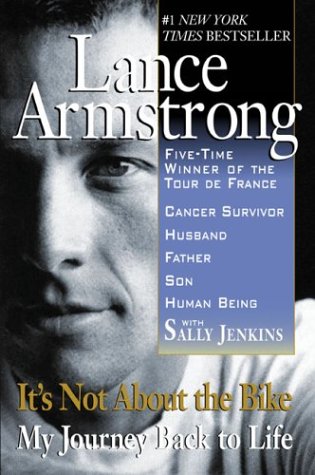 Autobiographies, Semi-Autobiographis and Autobiographical Fiction stories all relay their message from the first person perspective.
Autobiographies, Semi-Autobiographis and Autobiographical Fiction stories all relay their message from the first person perspective.+ Black Boy, Richard Wright
Wright grew up in the woods of Mississippi, with poverty, hunger, fear, and hatred. He lied, stole, and raged at those around him; at six he was a "drunkard," hanging about taverns. Surly, brutal, cold, suspicious, and self-pitying, he was surrounded on one side by whites who were either indifferent to him, pitying, or cruel, and on the other by blacks who resented anyone trying to rise above the common lot. This is Wright's powerful account of his journey from innocence to experience in the Jim Crow South. It is at once an unashamed confession and a profound indictment—a poignant and disturbing record of social injustice
-It's Not About the Bike, Lance Armstrong & Sally Jenkins
An autobiography exlaining the life of Lance Armstrong from his youth, through 3 forms of cancer, to his legendary status as a Tour de France champion.+ Walden, Henry David Thoreau
Thoreau lived mostly in solitude for over 2 years and 2 months in a cab in at Walden Pond. In his disconnection with general society he learned new motivations and methods for living deliberately.
Thoreau lived mostly in solitude for over 2 years and 2 months in a cab in at Walden Pond. In his disconnection with general society he learned new motivations and methods for living deliberately.
- The Absolutely True Diary of a Part-Time Indian, Alexie, Sherman
Sherman Alexie tells the heartbreaking, hilarious, and beautifully written story of a young Native American teen as he attempts to break free from the life he was destined to live.
+ Slaughterhouse-Five, Kurt Vonnegut Jr.
Billy struggles to make sense out of a life forever marked by the firsthand experience of war’s tragedy.
+ The Bell Jar, Sylvia Plath
Esther struggles against her oppressive environment and encroaching madness.
Esther struggles against her oppressive environment and encroaching madness.
+ The Woman Warrior, Maxine Hong Kingston
Kingston reconciles her Chinese cultural heritage with her emerging sense of herself as an American. The autobiography relays stories of her mother Brave Orchid, aunts Moon Orchid and "No Name Woman," and of her childhood heroine Fa Mu Lan — a legendary woman warrior. Each recollection explores the many forms of adversity that women face in the physical and emotional struggle in the search for one's own, personal voice.
+ Black Boy, Richard Wright
Wright's early life in the South from 1912 to 1927. This autobiography begins when 4-year-old Richard sets ablaze his grandmother's house and is nearly beaten to death by his mother. The punishment teaches Richard to survive any circumstance. Richard grows and observes his family members humiliating themselves in front of whites, while seeing opportunities for breaking out of stereotypes to become what he wants to be, a writer.
+ I Know Why the Caged Bird Sings, Maya Angelou
The book follows Marguerite's (later called Maya) young life in the segregated South. Abandoned by their parents at an early age, she and her older brother Bailey move in with their grandmother and crippled uncle in Stamps, Arkansas. Angelou's autobiography explores how her blossoming character helped her cope with rape, sexism, society's prejudices, and the isolation and loneliness she faced growing up.

No comments:
Post a Comment